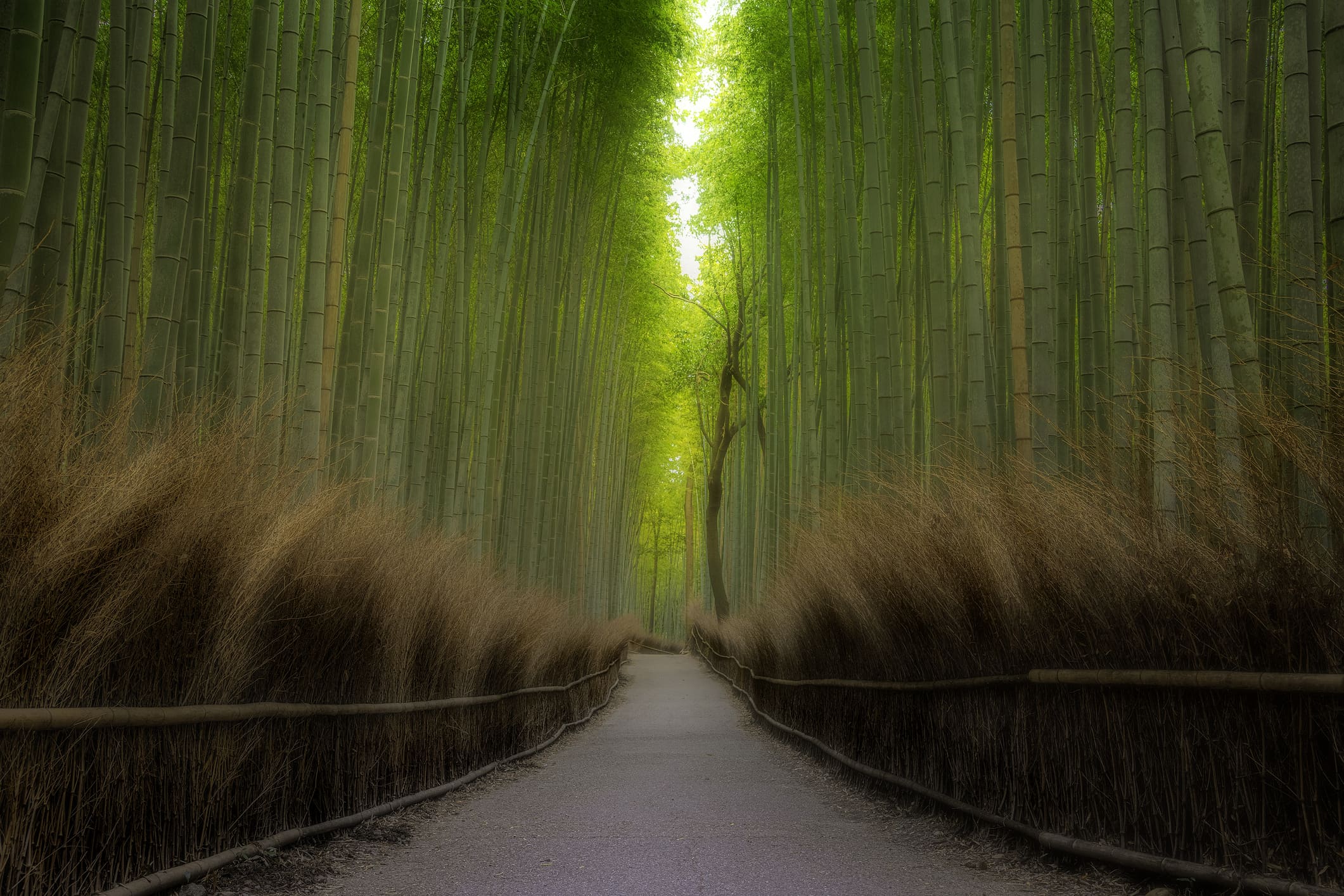Recognize the photograph above? It adorns walls, computer screens and websites for psychiatrists and financial planners.
It’s also on shower curtains, tote bags, maxi dresses, neck gaiters and ruffled bathing suits.
Though seemingly too beautiful to be real, the scene depicts an actual place. It’s Arashiyama Bamboo Grove, one of the most famous sites in Kyoto, Japan.
Beautiful but often crowded
Located on the outskirts of Kyoto, Arashiyama Bamboo Grove — or Sagano Bamboo Forest, as it’s also called — is Japan’s most famous bamboo forest. It’s believed to be one of the most photographed places in Kyoto, and perhaps one of its most photographically enhanced, too.
Arashiyama Bamboo Grove
Chanchai Duangdoosan | EyeEm | Getty Images
The internet is replete with photos of the paved walkway that runs through the 6 square mile grove. These photos are eerily similar, saturated with brilliant shades of greens and golds — even at night — and typically include just one person, if any at all. Some photographs show a woman dressed in a yukata, a casual version of a kimono, walking with a parasol in total solitude.
Stunning? Definitely. However, this is not the experience most travelers should expect.
Though reviews are positive — the forest gets 4.5 out of five stars on TripAdvisor’s traveler ratings — Arashiyama Bamboo Grove is rarely as quiet as photos suggest.
“Although it was raining and there were a lot of people,” said a recent TripAdvisor review, which added that “the whole experience was very enjoyable.”
Another was more blunt, stating: “Let’s be clear, it’s a nice place. But most of the time, you will not enjoy a peaceful stroll in a bamboo grove, feeling like you traveled the old days of the samurai. Instead, you will be surrounded by Instagram photo-snapping tourists … and most yukata-wearing girls you’ll see will be tourists.”
Usually there are people on the forest path — even at night —but there are ways to remove them from photographs.
L: Aldo Pavan | The Image Bank | Getty Images; R: Cheng Feng Chiang | iStock | Getty Images
It’s possible to walk the forest path in as few as 20 to 30 minutes, said American Constance Hsia. But, she told CNBC’s Global Traveler, those “who plan to take professional photos or want to post glamour shots on Instagram” could easily spend an hour or more.
She has visited Arashiyama twice, both times to see Kyoto’s famous foliage in autumn which, along with the cherry blossoms in the spring, are the busiest times to visit.
“I have been told that the gardens are beautiful year-round because the summer is very green and the winter snow is stunning too,” she said. “It’s likely Arashiyama will be crowded during every season because it will be on every tourist’s list of things to see in Kyoto.”
A photo of Arashiyama Bamboo Grove without the path.
Westend61 | Westend61 | Getty Images
Approximately 4.94 million tourists visited Kyoto in November 2019, the highest monthly total for the year, according to data company Statista.
Around six weeks later, Japan recorded its first case of coronavirus, which led to a new problem for the perpetually crowded city: undertourism.
How photos of the forest are edited
Photos on Instagram of Arashiyama Bamboo Grove range from emerald green to ashy gray, and even a pale baby blue.
A representative of the Japan National Tourism Organization told Global Traveler that the forest is “usually green all year round, even in winter” and that blue and gray shades “could be due to other lightings or photographic filters [or] effects.”
Editing eye-popping photos of the bamboo grove requires both camera and computer skills. Travel blogger and photographer Augustus Woods posted a 42-minute tutorial on YouTube explaining how to enhance images of the forest using Adobe Lightroom and Photoshop.
In the video, Woods explains how he uses a process called “masking” to remove people from the shot, and “cloning” to add details back in.
He describes in the video how he added a missing patch of thatch, removed a “distracting” leaning bamboo stalk, boosted the color of the bamboo, and adjusted the slant of the stalks. At the end, Woods has transformed a series of dark shots with strangers into a single spectacular photo of the forest.
What Arashiyama Bamboo Grove really looks like
An unretouched photo of Arashiyama Bamboo Forest.
Courtesy of Constance Hsia
However, those may not necessarily be accurate either.
Editing can more closely show what the photographer saw in real life, particularly for landscape photography, writes Dutch photographer Albert Dros on the photography website PetaPixel. Anyone who has struggled to take a good shot of a sunset or rainbow knows the camera doesn’t always capture the full extent of nature’s beauty.
Tourists visit Arashiyama Bamboo Grove in Arashiyama, Kyoto prefecture Dec. 8, 2018
Behrouz Mehri | AFP | Getty Images
Sites that are selling something often make the most drastic changes to images.
Is a trip to the bamboo forest worth it?
“Definitely,” said Hsia, who plans to return to Kyoto after Japan reopens its borders to international travelers.
“If I had only one day in Kyoto, it would be one place I would definitely see,” she said. “The experience is still enchanting, despite the crowds.”
An unretouched image of Arashiyama Bamboo Grove behind the beautiful foliage that brings visitors to Kyoto in autumn.
Courtesy of Constance Hsia
Arashiyama Bamboo Grove is always open, and tickets aren’t required. It’s typically recommended that visitors arrive in the early mornings or late evenings on weekdays.
Japan is largely closed to travelers from a long list of countries, including the United States, Canada, the U.K., France, Germany and India. Travelers who are allowed to enter must quarantine for 14 days upon arrival.
